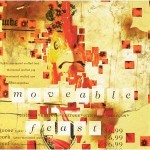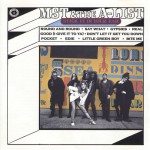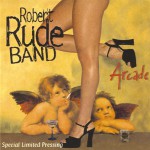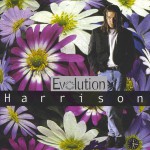 Thrillbilly
Thrillbilly
Moveable Feast
Burnside Distribution Corporation
After over six years of pounding the pines, touring the western half of the US, struggling to attain a foothold in the slippery terrain of the music business, Thrillbilly seem poised upon the precipice, ready to take a step up to the next plateau on the circuitous trail to the top. With longtime drummer Tom Killian retiring from the band, Danny Carbo has assumed the role, playing a bit more behind the beat than his predecessor— lending a more laid-back feel to some of the more uptempo tunes. But other than that substitution, Thrillbilly have not effected any major changes to their sound. It’s not like they have added a string quartet or a bank of synths to the act.
And the act still and will always hinge upon the machinations of lead singer J. Bowman, whose admiration for Ernest Hemingway cannot be limited to strictly a literary sense. Bowman emulates Hemingway’s life in that he lives through the tales he tells. They are the recounting of real life experiences, in one form or another. For J. this is especially evident in the extended hangover of “La Cruda.” But J.’s realm of enlightenment and depth of observation render nearly every song an illumination of some personal truth.
The rest of the quintet, lead guitarist Mark Dybvig rhythm guitarist/background vocalist Doug Lindstrom and bassist Davey Hall have made the most of their supporting roles, much as the members of REM did for Michael Stipe, creating an assured musical footing from which Bowman can launch his howling excursions into the depths of human experience.
As seems to be a Thrillbilly tradition, the band have borrowed one song from their last recording, Black Top Open Road. “American Sex” sounds about the same as its predecessor with the aforementioned rhythmic alterations. But it’s a vibrant slice of Americana and certainly worthy of inclusion on any album. Likewise another signature Thrillbilly rocker, “Attitude,” also appears on Live At Laurelthirst II (reviewed in these pages in August). So, beyond the prospect of a definitive “Thrillbilly sound,” which is already in place, there is an inherent familiarity already built into the core of this album.
Of the nine remaining songs, the band continues to stretch from its REM-like foundation, exploring other styles and colorations: strong Pop sensibilities as evidenced in other successful Rock outfits such as the Gin Blossoms and Big Head Todd and the Monsters, found most notably on the rousing “Slacker;” and occasional Country and Blues notions that crop up from time to time. Still, the Stipe-ish twang in Bowman’s delivery, the yearning quality of the vocal melodies and the chiming drone of the instrumental accompaniment most resembles the work of REM.
Dybvig, especially, has grown in his capacity as lead guitarist, widening his palette of tones and the variety of his sonic textures, most reminiscent of George Harrison’s Beatle days, in providing the right sound for the milieu of a particular song. And Lindstrom has refined his backup vocals, seamlessly weaving tight harmonies over Bowman’s whining wails, adding depth and energy to the overall presentation.
“Fall Down” would qualify as a prototypical Thrillbilly number. Jangling, acoustic-flavored guitars ring across four well-known chords as J.’s moaning harmonica cuts through the din. A memorable chorus focuses the forlorn quality of the verses, which occupy themselves with a “love gone wrong” motif. “La Cruda” adopts a sort of Lou Reed atmosphere. Dybvig’s Wes Montgomery-esque octave leads play against an acoustic guitar and dancing percussion álà “Walk On The Wild Side,” with a similar storyline in a different setting, “Playing Hemingway again/With a little Napoleon thrown in/I was the Marquis De Sade and Ghandi holding hands/Just for laughs.” Later in the song, Bowman elaborates upon the reckless Muse he sometimes embraces: “Last night was a moveable feast/Just like an American expatriate in Paris in ’25, drunk/on the Rive Gauche, getting bitched out by Gertrude Stein.” Let’s hope that Bowman’s admiration for and identification with the writer do not extend so far as Hemingway’s final gamut.
“Lose To Know” maintains the distinguishing anthemic demeanor, while adding Eagles tinged vocal harmonies and a loping rhythmic canter. Lyrically, Bowman offers an alternative to self-destruction through the application of his artistic expression. “We can’t stop the world my friends/?But I can write a song with guitar and pen that goes/You’d have to lose to know where I have been.” But, in the end, J. once again succumbs to the influence of his demons. “The sun’s half up, I’m half on my lips/I’ve been matching Dean Martin sip for sip/Don’t preach to me about the time I kill/Cause I don’t give a shit how I’m living.” Alright then! Party on!
Armed with conspiracy theories and an anti-militaristic stance, “War Tune” is a raucous romp, as J. casts a jaundiced-eye at the mentality which comprises our corporately owned defense program, and the steely drones who mindlessly carry out its deadly business. An interestingly detached viewpoint. “Spaceman” and “Texas” offer two distinctly different perspectives of “life on the road,” the warmth and chill, the intimacy and distance that comes with the territory.
Thrillbilly’s territory is the underbelly, where skin meets the gritty pavement dead-on; where collisions are the desired result in a game of chicken with a car of dereliction and excess. Still, it is the haunting quality of lost dreams and lowered expectations, combined with alcohol and gasoline, that seem to fuel the engines of this vehicle— careening toward the essential disillusionment that now drives our very nation.
 MST and the A-List
MST and the A-List
Stick It In Your Ear
Self-Produced
It was back in the early 80s when Dub Squad ruled the roost in Portland. Vocalist Alan Alexander fronted the band which also featured Mel Kubik on keys, sax and background vocals. She was the musician. Karen Searcy sang back up (and occasional lead) vocals. She was the soul. And loose cannon Mary-Sue Tobin sang backup vocals and perhaps occasional sax. She was the balls.
More recently, Mel, Karen and Mary-Sue formed Loud Sistah, wherein each of the women had their moments in the spotlight, leading an all-pro band of sidemen through a variety musical styles, from Adult Contemporary to Funk, Soul to Hip-Hop. Mary-Sue’s contributions generally fell into the Funk and Hip-Hop categories, where her abilities as a poet came to the fore.
This album contains a couple of Loud Sistah numbers, as well as lots of new stuff. Members of both of Mary-Sue’s former bands, Kubik on backup vox and sax, guitarist Newell Briggs, drummer Allen Bosworth, bassist Will Moye and a killer horn section, led by peripatetic trumpeter Gavin Bondy form the nucleus of the A-List band, join in creating a tight, sparkling sound that showcases her formidable, but sometimes reticent talents. The instrumental arrangements are hip, clean and crisp as a new one-hundred dollar bill; venturing across all of the aforementioned styles (and then some, check out “Don’t Let It Get You Down”), with a sinuous slickness that defies the easy pigeon hole. But one thing remains true: Mary-Sue still has balls.
But they’re different balls from those to which we have become so accustomed. Two songs among the nine presented here, best illustrate the complex dichotomy which shapes a tough and fragile psyche. “Pocket,” a hold over from the Sistah days, is given a softer, Bluesier treatment here. Mary-Sue’s lyrics clearly defines her turf.
“Ya got a pocket for the one, a pocket for the two/A pocket for me and a pocket for you/ Filling out my forms for the Columbia Tape and Record Co./Jazz or Classical. Pick one box/ They wanna know your demographics, baby you’re a target for their next big hit/But for me and my friends ya know it’s all a load of shit/Miles in my bedroom, AC-DC in the hall/Boomin Reggae in my car/Louie Armstrong on my wall/Borrow my brother’s Queen CD. ‘It’s got the greatest hits of all’/And when I get sad, bang my head against The Wall.” Mary-Sue’s delivery, always breathless as a schoolgirl, but smug as a defiant streetwalker, struts through the rugged rap of the verses like a cat outside a dog run.
The other, more childlike side of Mary-Sue’s personality is demonstrated with “Little Green Boy,” a lyric she co-wrote with young Sage Paden and sings with young Damian Moye. The result is strangely reminiscent of “Jackie” by the Dukes Of the Stratosphear (XTC). “Little green boy needs to come in for a landing/Little green boy doesn’t want to go to bed/Little green boy wants an M&M cheese sandwich/Little green boy wears a helmet on his head.” Throw this over a sprinting bassline, skanky horn hits, Mary-Sue’s eerie keyboard parts and Briggs’ shredded guitar and the result is a curiously delicious concoction.
The other songs give insight into Mary-Sue’s often enigmatic brain. The Reggae textures of “Round And Round” are augmented by Mary-Sue’s orchestral keys, creating a lush depth, as she vocally prances atop Bosworth’s smart, snare foundation. “Real Good” fleshes out Funk and Soul expressions, with a strong chorus, effective harmony vocals, and sassy horn embellishments. “Gypsies” grounds itself in Mary-Sue’s jazzy block-chords on piano, while Bondy mutes a smoky backstreet trumpet line against gentle Latin percussion. Vocally, Mary-Sue sounds sort of like Debbie Harry.
While true Hip-Hop beats are mostly absent, Mary-Sue Tobin can turn a phrase with the best of them. Her poems always comes straight from the heart, displaying equal portions of bitchy vulnerability and idealistic contempt. She delivers them with a voice that exhibits similar contours. This is a very unique record, which bends and stretches at the boundaries of genre, incorporating a profusion of musical contexts and references. It was created by an obvious fan of contemporary music, who managed to weave the many disparate threads of her influences into a distinctive brocade of unusually high quality.
 Robert Rude Band
Robert Rude Band
Arcade
Self-Produced
Robert Brown has been toiling in Rainyville for nearly twenty years, first making his mark as the intrepid leader of Nimble Darts, a very successful local band in the early 80s. Nimble Darts were notable for many things: well-crafted, Brown-penned songs, tight arrangements and quality musicianship— but best remembered for lead singer Lori Calhoun, whose father was a ’50s TV cowpoke gunslinger. That, and the fact that the band in one of its later incarnations served as a launching pad for the career of an enterprising young lad named Dan Reed.
Since the breakup of the Darts in the mid-80s, Brown has never been far from the scene, producing permutations of Robert Rude and the Attitude and the Robert Rude Band with tenacious regularity. Throughout that time, the focus has remained pretty much the same. Guitar driven, straight-ahead rock conveyed with a degree of polish and intensity.
Robert runs a gamut of styles, from the surefire Romantics-like swagger of “Girl Like You” and “Tell Me,” the Stonesy grind of “Dirty Little Secrets,” the Country twang of “Good Friend” and “She’s An Angel,” to the folky Pop of “Better Way.” Robert’s dusty vocals call to mind Tom Petty, John Hiatt and Graham Parker. His guitar abilities are perhaps best showcased on the bubbling Hendrixish “Demons,” a song which bears some similarities to “The Wind Cries Mary.” The early Police come to mind on “See Anne,” Mark Knopfler on “Temple Dogs.”
But the Zep colors of “Raven” and “Lecia Says” shine the brightest. “Raven” wheels upon a roiling Delta Blues slide guitar figure that gives way to a jumbo beat and searing riffs that echo Jimmy Page and Eric Clapton during his Bluesbreaker period. The chiming, Middle Eastern flavored guitars of “Lecia Says,” reflect latter-day Page influences, while the chorus hints at Janes Addiction (as if fronted by Peter Gabriel). A heady mix.
Robert Brown presents familiar sounding songs in familiar settings, not exactly breaking new ground, though not buried under the old ground either. We find him here, exploring his various roots, chiseling a niche, carving his initials in the tree of local bands, still making his mark.
 Harrison
Harrison
Evolution
Nosirrah Records
Unbeknownst to most local aficionados, Andi Harrison scored big a couple of years back with his CDButterflies And Demons. A single from that record, “Close To You” apparently reached #3 on the Gavin Adult/Contemporary charts, not that anybody around here heard much about it. A cursory perusal of the first few cuts of his new product would lead one to believe that Harrison was something of a vainglorious chap, with an admiration for Trent Reznor (among others), a boatload of gear, perhaps a little too much free time and occasional delusions of grandeur.
But dig a little deeper, into the real guts of this opus and you’ll find an intelligent guy with a quirky songwriting talent, who crafts odd little Rock suites with amazingly arcane consistency. He’s not much of a singer. His lyrics often border triteness. But Andi Harrison is a genius when it comes to production. And his knack with a hook should be the envy of every angler in the nation.
And, having auditioned the entire album, the first name that comes to mind, when so inclined as to draw a comparison to the work of Andi Harrison, is that of the late great Harry Nilsson. There is something affably warm and laughably charming in many of Andi’s productions. So try to think of Nilsson produced by Trent Reznor in some alternative universe: and you’ve got an idea of what Harrison sounds like. Sort of.
Anyway, if you need proof of the aforementioned anomalies, and many others, simply dial up “Super Deluxe” and see what you make of it. Over half of a slowed-down, “Smoke On The Water” guitar riff, turned slightly funky surrounded by other layered guitars; vague keyboard interjections, an array of effected sounds of indeterminate origin and multi-ply vocals, including those of Nu Shoozer Valerie Day in the chorus, Harrison cheerfully assesses the vices of greed and need.
“Inadequate” lays on a creaky bed of overdriven guitars, a blanket of distortion thrown against a low rumbling bass; tumbling into a pretty chorus. Very nice. Entirely different guitar tones color “Jupiter,” a song that, but for the jangly American guitar arrangement, could be the work of Depeche Mode. A spacey guitar solo orbits the outer reaches of this particular sonic solar system.
Harrison’s rendition of Michael Jackson’s “Billie Jean” is entirely faithful to the original, but heavier and denser, with thick, dark bass and sharp, jagged guitar accents. Andi’s antithetical vocals, low and detached, add a more ominous edge to the production. Conversely, “Shallow People” takes a more happy-go-lucky approach, as Ms. Day returns for harmony vocals in the chorus.
Andi Harrison displays ingenuous abilities as an instrumentalist and as a creator of intricately constructed musical worlds. His message isn’t particularly deep, but is a universal solvent which washes clean what is not always altogether clear. There’s a reason why Harrison got his last album played (a lot) on the radio. It’s the same reason why this one will probably receive the same attention. It’s good stuff.
